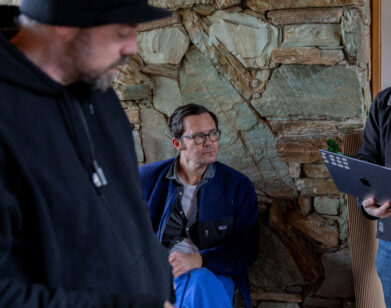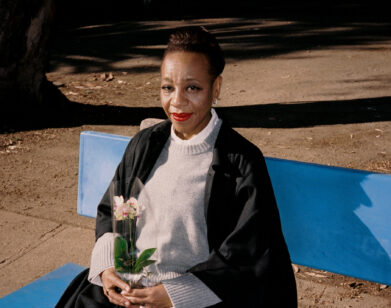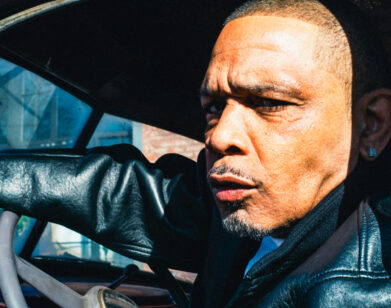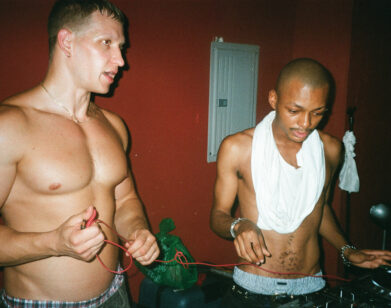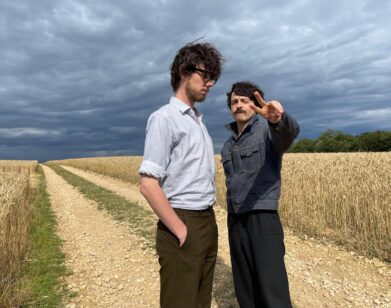BAD GUY
Tony Dalton Talks to Bob Odenkirk About the Birth of Lalo
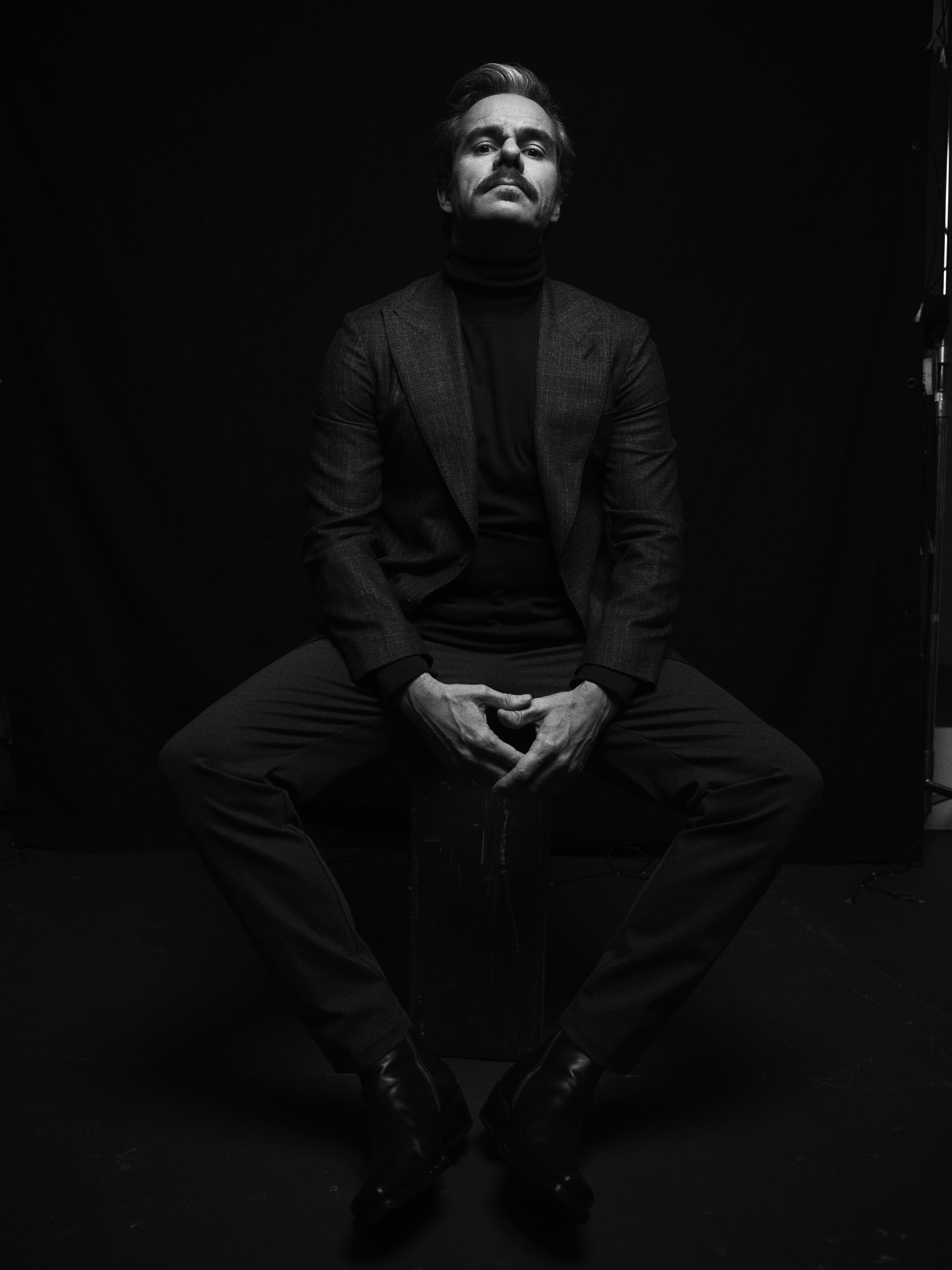
With the sixth and final season of Better Call Saul in full swing, all eyes are on Lalo Salamanca. As played by Mexican American actor Tony Dalton, the cartel member has arguably become the most captivating character in a series overflowing with them. As sadistic as he is charming, Lalo has emerged as the show’s Big Bad, but thanks to Dalton’s unnervingly charismatic performance, he’s somehow likable, a cold-blooded killer you’d want to have a beer with. Dalton recently got on the phone with his costar Bob Odenkirk to discuss how he pulled off that magic trick.
———
TONY DALTON: How are you, Bob?
BOB ODENKIRK: I was just doing my book tour, and it was great, except I got COVID because in England they’re not wearing masks at all.
DALTON: When did you get it?
ODENKIRK: My symptoms started on Tuesday of last week when I was still doing my tour. So I probably got it two days before. I’m over it now and it sucked. The worst part was the muscle aches, but let’s not talk about COVID because I’m so sick of it. Your performance as Lalo in Better Call Saul has skyrocketed you to yet another level of fame, but you didn’t come out of nowhere. What are your biggest roles before Saul?
DALTON: I did a movie that I wrote a long time ago called Matando Cabos. I was watching Mexican movies and they weren’t that interesting, so I wrote something inspired by Snatch and Pulp Fiction, and that made all the difference in the world, Bob. It put me in another bracket. And then I did Sr. Avila for a bunch of seasons, which is for HBO for all of Latin America, and that leads into where I am now.
ODENKIRK: Can I ask you about that movie? What is the title’s translation in English?
DALTON: Killing Cabos.
ODENKIRK: And you wrote that alone or with someone?
DALTON: I got together with a bunch of buddies and we wanted to do something. We kept saying we were going to do it, and then one day, you get one of those reality checks where you go, “I got to get shit done.” And we sat down and I wrote the whole thing.
ODENKIRK: Beautiful. Now, Sr. Avila was also a big hit. And in that show, you play a bad guy?
DALTON: Well, I wouldn’t go so far as to call him bad. He’s just an assassin who killed his wife.
ODENKIRK: Right, so he’s not the worst guy you ever met.
DALTON: Exactly.
ODENKIRK: He’s not Donald Trump.
DALTON: Come on, let’s keep it clean.
ODENKIRK: Let’s not get political and let’s keep it clean. What did that make you think about playing a bad guy? I’ve only learned about acting in the last few years, and some would say, I haven’t learned anything.
DALTON: I would say the opposite.
ODENKIRK: But one of the things I learned is that good guy, bad guy, that shit doesn’t matter. What I’m always looking for is, is there another side to this character than the side you mostly see, or first see? If the character is granted a bit of self-awareness or even a lot, it’s a good role to me.
DALTON: Absolutely.
ODENKIRK: Because I think everybody has self-awareness. The worst person in the world knows in private that they’re the person in the world. But you’re incredibly likable as Lalo.
DALTON: To begin with, all the writers are amazing. These guys have been together for a while, and they know exactly what they’re doing. So it all starts with them putting it on the table, and then you show up and see what you can bring. Sometimes they go, “No, no, no, no, no, don’t do that.” And other times, they go, “Oh yeah, that’ll work.”
ODENKIRK: Were there any moments you can think of early on in playing Lalo where maybe you were being asked to play an arch or conceptualized evil, and you softened it or made a different choice than how it was scripted?
DALTON: I already had in the back of my mind the thought about doing something that’s very far away from the character I had just done. When Lalo was coming around, I was already thinking about doing things a little more outward. I remember an interview with Geoffrey Rush for Elizabeth, where he said, “I don’t want to be another villain. I just played a villain.” And he goes, “Yeah, but you know what? This villain kills with a smile.” And that always stayed with me, that maybe one day I’ll get to play a guy who kills with a smile. And when I saw Lalo, I figured, “Let’s go for it, man. This is the time.”
ODENKIRK: And there was no issue with marrying that up with what they wrote? It seems to fit perfectly.
DALTON: I think so, too.
ODENKIRK: Was there a conversation about it?
DALTON: I talked to Gordon a lot, the writer. You show up there with your hat in your hand, and you’re just giving out ideas to see if you can create something. A lot of times it happens that they say, “Shut the fuck up and don’t do it.” Not in this series, but in other places.
ODENKIRK: But that first day you recall finding it working together?
DALTON: One thing that’s important to realize is that the first day that you show up on set is the day you have to have the most balls, because whatever you do that day, you have to stick to it. So you have to show up very comfortably, because otherwise you’re not going to give it your best. Come in swinging.
ODENKIRK: Yeah. Come in with an idea, come in with confidence. Because if you’re not confident with the lines, you’re going to be protecting your ego. The hardest part with a show like Better Call Saul and the interaction between writers and actors, is that it’s an intricate plot, it has a lot of surprises and switchbacks, and there’s things they have planned that you don’t know about. So you might want to make a choice and they might say, “No, you can’t do that because five episodes from now we need you to do something that would contradict that.”
DALTON: Absolutely.
ODENKIRK: That’s the hardest part—you don’t know what you haven’t read yet. And you want to respect the writers. You just went on about how great they are, but at the same time, you’ve got to interact and you got to own the part. It can be very hard. And it’s a lucky thing when it fits together the way it did for you in Lalo.
DALTON: That’s important: We don’t know what’s going to happen to these characters when we’re filming, because you only get one episode at a time. I look at it a little bit like real life. I don’t know what’s going to happen tomorrow.
ODENKIRK: I’ve played Saul for a while, and I want to play somebody who’s less selfish and or driven by resentment. So in my next role, I don’t want to play somebody like that. How does Lalo affect what you’re looking for next? And the hard part is that you might be offered an amazing bad guy role.
DALTON: I get what you mean, but you can get type casted by a big director to play that kind of role again, and you’re like, “Of course I’m going to do it.” If they call me to play the next Bond villain, I’m all over that.
ODENKIRK: Have you had a bump in the American entertainment industry based on Lalo?
DALTON: Yeah, they gave me that part in that Marvel series that I did, Hawkeye, basically because Kevin Feige really likes Better Call Saul.
ODENKIRK: Did you have a good time playing that role?
DALTON: It was great. It was right in the middle of Saul, so I was coming back and forth from Albuquerque to Atlanta, and we were still in the middle of the whole pandemic, but you’re grateful to have two jobs during times like that.
ODENKIRK: I have to watch that show.
DALTON: It’s for the kids.
ODENKIRK: Was there any issue in stepping back into Lalo after such a long time off? I’ve gotten really good at just moving into Saul. I’m not intimidated by it. I was at first, and I just don’t feel that way anymore. I feel like I know that guy so well. Just give me the lines and I’ll do it. What about you?
DALTON: I felt the same way. I was anxious to get started, and when we got there, I get the lines, go on all these big, nice long hikes, and just say them over and over.
ODENKIRK: You’re an actor who does his homework, has skill, and yet doesn’t sweat it too much. Is that a show, or is that real? I ask because I think you and I probably see it the same way, which is, it’s a wonderful gig but it’s not heavy lifting—we’re not digging coal.
DALTON: Correct.
ODENKIRK: But at the same time it can stretch you and it can challenge you, but it’s hard to talk about it as a hard job. Do you perceive acting as something you have a command of and a feeling of confidence with? And did you start that way or do you feel that you developed that?
DALTON: I think I developed it through the years. I used to take that shit really seriously. And it’s not that I don’t, but I feel like when you let go a little bit and you let yourself get a little bit more happy with the job you’re doing, you can explore different options instead of when you approach it through worry or fear. And like you said, it’s not like we’re opening somebody’s heart up. We’re acting.
ODENKIRK: You can understand why young actors are driven by insecurity and fear, and almost a desire to make it unpleasant. “If I make it unpleasant then I know I worked hard today.”
DALTON: Yeah, exactly.
ODENKIRK: I remember thinking somewhere around the third season of Saul, when you’re trying to do that self-reflective critique of your work, as you’re doing it, you’re thinking, “You know what? I’m going to think about this part. I’m going to think about what he’s feeling and what the emphasis should be, but then I’m just going to do it. And guess what? The way I do it will be the right way, because I’m doing it and I play this part. Because I’m the character, because I’m going to follow my instinct, it therefore will be right because I’m the character. And so it can’t be wrong.”
DALTON: There’s a lot of people like that. I’ve talked to a lot of actor friends of mine, who think, “Look, man, there’s only one way, and it’s my way, because I know this character better than anybody.” And it’s like, “No, man. Take it easy.” First of all, it’s the writer’s character to begin with.
ODENKIRK: Right.
DALTON: Also, there’s a lot of different ways to approach a situation. The same person can show up to a restaurant and say, “Give me a fucking table,” as, “Hey, can I please get a table?” It’s a different day of that person’s life.
ODENKIRK: Do you think Lalo has any redeeming qualities? And it’s okay to say no, because for instance, people ask me if I like Saul Goodman, and I have sympathy for Jimmy McGill, but I don’t like Saul Goodman. I absolutely don’t want to be around that kind of person. It’s situational ethics on display, and I’m not cool with that. I don’t think it’s funny. I don’t think he’s cute. I think he’s an asshole, and I don’t like those kinds of people. How do you feel about Lalo and the way in which he’s kind of unmoored from humanity?
DALTON: Personally, I respect him. I think the guy goes through life without worrying about too much, and seems to be a guy that you want to hang out with. Do I agree with the business that he’s in? Of course not. But if the guy had a couple of car dealerships or something, he could be fun to be around.
ODENKIRK: Do you think that Lalo thinks about death like, “Fuck it, it’s going to happen.”
DALTON: Yeah, that’s his real secret. It’s the fact that he knows that all narcos are going to end up shot in the head, so says, “Let’s have a good time then.”
ODENKIRK: Right. He’s compartmentalized and fully accepted it. And so it’s not a burden on his life.
DALTON: Exactly.
ODENKIRK: Why do you think people like Lalo? And they do, they love him.
DALTON: Because he’s charming. Charming people are always welcome places, and Lalo’s got a lot of charm.
ODENKIRK: Do you feel that you, Tony Dalton, have that same level of charm? Because I think you do. You’re less evil, only slightly.
DALTON: Only a little bit.
ODENKIRK: But I think you’re considered a very charming guy. Are you okay with being considered that way? Do you think that’s a genuine representation of how you live in this world?
DALTON: I would like to think so. I’m sure if you ask other people, they might not think I’m so charming, but I guess it all depends. I like to go to work and have a good time and make good conversation, make friends, because I’m living the dream. It’s like, why wouldn’t you?

